As part of the run up to 2021 SaaStr Annual in the SF Bay Area Sep 27-29, we’re taking a look back at some of our top sessions of all times. Get best price tickets here!!!
This session is particularly fun to look back on. In 2017, Zapier, Walkme and Dialpad were all beginning to break out. Fast forward to today, Walkme has IPO’d, Zapier is worth $3B, and Dialpad is worth $1B+.
So let’s take a look back to a deep dive with the CEOs on what they learned building their first senior teams:
———-
As a founder/CEO, building your first management team is something that you often lose sleep over. And for good reason.
Which role should you hire for first? Do you go with an outside individual or someone in your network? How can you recognize that a VP is great, not just good? Is it better to bring on a natural athlete or an expert? For starters, your first hire should be someone who can complement your skills, someone who is strong in areas where you’re weak, but it goes much deeper than that.
Nikos Moraitakis, CEO @ Workable, moderates this insightful session with Dan Adika, CEO at WalkMe; Mallun Yen, Chief Business & Product Officer at RPX Corp; Craig Walker, CEO at Dialpad; and Wade Foster, CEO @ Zapier. The panelists offer their insights, which at times conflict with the viewpoints of other panelists, on hiring a cohesive team that can really scale the business.
And if you haven’t heard: SaaStr Annual will be back in 2021, bigger and better than ever! Join 10,000 fellow founders, investors and execs for 3 days of unparalleled networking and epic learnings from SaaS legends and more!
TRANSCRIPT
Announcer: Please, welcome CEO of Workable, Nikos Moraitakis to the stage.
Nikos Moraitakis: Good evening. Hello. I’ll introduce my co panelists. This is Dan, CEO of WalkMe, and Wade, CEO of Zapier, and Mallun, Chief Business Officer of RPX, and Craig from Dialpad.
[applause]
Nikos: Thank you for joining us. Today’s topic is dear to me. Obviously, I can’t imagine a chief executive not having loss of sleep over building a management team. I am guessing it’s probably the hardest problem to solve, hiring a job, let alone at this level.
I’d like to have an open discussion, so we won’t go one by one, but I already have a few good insights from the chat we had backstage.
The way I understand this problem, briefly, just a set up a framework, is that there are a lot of interesting questions around it. One thing is the timing. When? What makes you feel that you need to level up your management, set up your first management team? However you want to call it.
Is it a time? Is it a size of company that does it? Is it a particular event that triggers it? I’d like to hear some personal stories about that.
The second thing is what are you looking for? Why are you doing this? Why are you trying to bring it to the company?
The third and perhaps the most interesting is how it fits with the existing dynamics with the company. With the existing people inside the company, the question of nurture versus outside hire, and how do people deal with this transition? It’s a company transition, not just a personal transition.
Mallun, you’re probably the most experienced of all of us here.
Mallun Yen: [laughs] I don’t know about that.
Nikos: You’ve been telling me backstage, and I find this fascinating, this thing about athletes versus experts and what do you expect to find when you hire executives. Can you tell us a little bit about that?
Mallun: Sure. One of the challenges is trying to determine, when you’re at a certain size of company, whether you continue to hire what are natural athletes. I think when you first start a company, generally, you’re hiring people who have whatever background.
Everyone here I think actually has a different background that they bring to the table, whether it’s a programmer, whether it’s in finance, whether it’s in law. Do you know he used to be a lawyer, so did I actually?
I feel like the core team is generally a bunch of natural athletes. You come together because you have a common goal and a common vision, and then from there, obviously, you need to expand.
One of the examples I’ll give you is what RPX does, because you probably have not heard of RPX. RPX reduces and insures against patent risk. What that means is as part of the business, we actually had to start an insurance company. An insurance company is, as you may know, a highly regulated business.
When we started the insurance business and we thought about developing the insurance business, we had a bunch of natural athletes, people who were super, super smart, who could research anything. None of us knew anything at all about insurance, and so we learned it from the ground up.
We were able to do things. We were even able to build your basic actuarial model with just some smart quant people who came from McKinsey who were part of my team.
At a certain level, what we realized is, especially in a highly regulated industry, you do need to bring in some adult supervision. It’s not to necessarily manage the entire team, but we needed someone who had experience in actually building an insurance business, who understood the regulations, who understood how we could do this thoughtfully, who had the relationships with things like the reinsurers.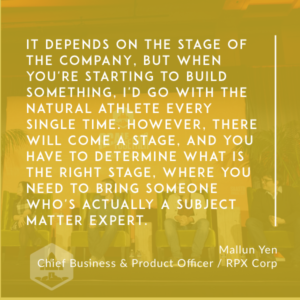
I would say it depends on the stage of the company, but when you’re starting to build out something, I think I’d go with the natural athlete every single time. There comes a stage, and you have to determine what is the right stage, where you need to bring someone who’s actually a subject matter expert, who has experience in the stage.
I know everyone has lots of thoughts about hiring that person too early, and how do you bring that person into the organization without making the original team feel like they’ve been topped.
Nikos: Craig, you’re 170 people now?
Craig Walker: What’s that?
Nikos: 170 people.
Craig: Yeah, 170 people now.
Nikos: Then it was the time for you.
Craig: Putting the management team together was really around stages of the company. At the beginning, my vice presidents were engineering, and product, and a designer.
Making sure we have product market fit was effectively number one. Build the product. Get it into the market. Start getting some feedback.
As the evolution of the company, as we started moving up market, started selling to enterprises, it was, “OK. Now we have to hire VP marketing who has enterprise experience.” We got this great guy from Zuora. Then we needed to hire a sales guy who had experience selling to enterprise. We got the guy who ran enterprise sales at Rackspace.
Then we had to hire a CFO to start counting the money and making sure that everything made sense and the margins made sense. We brought in a CFO from Mblox. At each one of those stages, it really was, “OK, now we go to the next level. Now, we go to the next.” It’s been five years since we started. I would’ve hired the CFO a year earlier.
This is my third startup. I never had a CFO before. I always resisted it. They always seemed expensive to me. Marc Andreessen was on our board, and he was telling us, “You need a CFO. You need a CFO.”
I resisted. I finally got one about six months ago. He’s made my life so much better. He deals with everything that was very, very difficult. If anything, I’d say do that a little sooner than you think.
Nikos: In your case, I understand your company also shifted slightly on the market, like from SMB to bigger customers. Do you need to get different people for something like that?
Craig: Yeah. Our company, we basically unified communications in the cloud. Dialpad effectively integrates with Google apps or Office 365 to give a cohesive product. We also do UberConference. UberConference started as this freemium, kind of funnel builder for later sales product.
We didn’t have really any enterprise DNA of how to support them, how to do POCs, how to implement, how to train, how to do change management. Once we started getting enterprise customers, like Motorola was our first Dialpad customer, we realized that we were lacking enterprise skills of how to do those various things, which is why we went and got this more mature staff.
Getting them to have the right DNA and fit the culture of a company that had been around for three or four years was really important too.
Nikos: Dan, 400 people in 5 years, in a relatively flat organization. How do you do that? How does this fit into then…?
Dan Adika: We started in 2012, 400 people, different offices around the world. We don’t have a CFO yet. The organization is very flat. To what you asked, I don’t think there is right time to hire a VP. There is no formal…I think that how we fit in WalkMe, is first we like that people will grow within the organization.
As you said, people take it hard if suddenly you say, “Hey, this is your new EVP. You’re going to do what he or she said. That’s it.” When we do it, I look at it as build versus run. As the company grow, you need to be in processes that only you know how it works in your company.
There is no magician that comes from the outside and build it for you. Of course, they can help you build it, but at the end, it’s on you.
Nikos: At this growth speed though, do you always have the time to nurture an individual? Were there cases where you actually needed to bring experience from outside?
Dan: Yeah, I can’t say that we didn’t try. We had bad hires in the top level that really hurt the company. It’s the worst thing that can happen to a company, to bring someone that high and it’s not working out, because the damage that happens takes a long time to fix.
Mallun: Dan, can I ask a question?
Dan: Yeah.
Mallun: It’s very painful when a very expensive senior hire doesn’t work out. Why didn’t that senior hire work out?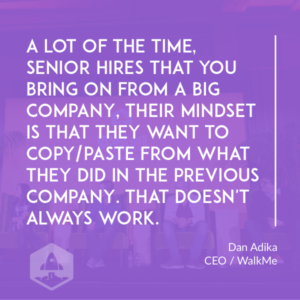
Dan: I think that a lot of senior hires, you bring them from big company, Salesforce, Oracle or whatever company that you hire from. A lot of time in their mindset they want to do copy/paste from what they did in the previous company, “That worked for me at company X, it’s going to work like that in WalkMe.” No, WalkMe is completely different.
You need to understand the basics of WalkMe, the culture of WalkMe, how we do things in WalkMe. Only then I think that you can build around it in a very sufficient way. If someone is trying to force it, it’s just not working, and it’s exploding in our face at the end.
Mallun: I’m curious, and I know you’re the moderator, but I’m curious, how can you tell? There are certain individuals who can come from a large company and go to a small company. Some of the people up here came from large companies and succeeded in small companies.
I’d be curious, including what our moderator thinks, about how do you spot when that will work and be successful, and when it will be someone who basically will just copy and paste. I’m sure you did a lot of diligence in trying to figure out whether that person would succeed.
Dan: For sure. I think setting the expectation with any high up management it’s key. We have very clear KPIs that we what we want to achieve, what we want to see. If they’re not meeting those KPIs, they’re not doing their job well. That’s the only way for me to know if someone is doing their job.
By the way, I strongly believe that if I’m bringing a manager to the management, or even not with the management, they need to teach me what to do. I don’t need to tell them what to do. The only thing that I can manage them is the KPI.
They get full freedom to do whatever they want. They can do it their own style, but there is a KPI. X amount of revenue, X amount of churn, X amount of growth in marketing, etc. That’s it.
[crosstalk]
Nikos: I don’t think that copy/paste it’s always a bad thing. Sometimes it’s exactly what you want, but they have to be very deliberate. The way I think about it, there is cases where you actually want someone with experience, who’s done something before, and they’re going to copy/paste it.
In the good sense, like go and build the kind of organization and process that made them successful in the past, but you need to hire that kind of person when you’re willing to make a big investment and a big change in that area.
If you bring that person just to manage whatever you had on a little budget, you’re just not getting any value. They’re not going to bring you your best people, they’re not going to do the things that you expect them to transform your organization.
There is cases where you don’t want the copy/paste guy, you want the builder, but there is no rule for that. [laughs]
Dan: I do want to say that I don’t think that it can’t work, of course it can, 100 percent. It didn’t work for us doesn’t mean that it doesn’t work. I do think that, and from the insurance part, there is a risk. That now as a growing company, and we’re growing very, very fast, not just revenue, head count too, and we are at the point that we can’t take that risk right now.
Maybe later on we can take that risk, and then it will make sense when the processes will be in place. That’s the time to bring more grown up to run the things. This is the difference between build versus run. Now we building a lot of stuff, and then when we feel that it’s working, it’s a machine, we can bring…
Mallun: We had some grownups in the company, but we started the company in 2008, and then took it public in 2011. A lot of those grownups were hired at that point where we were about to go public, or public.
Back to your question before is, I actually generally go with a natural athlete versus the subject matter expert, except when you’re at the stage where you need it. I don’t know. Wade?
Wade Foster: Yeah. I think the best folks are able to bring that experience to the table, but they are also able to mold themselves to the culture of the company as well. When you’re looking in hiring, you talk to them and have those honest discussions about, “This is what we believe as a company, this is how we operate. Does that fit with how you, as an expert in this field, can operate too?”
They can come in and maybe copy/past a little bit, but they can do it in a way that fits within your organization. Then help you scale it and bring some of that expertise to the table.
Dan: We talked backstage and I think that Wade didn’t introduce the company, but they don’t have an office. How do you do it?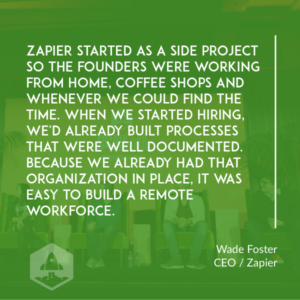
Wade: [laughs] We’re 70 people without an office, 100 percent remote. For us it was pretty natural because we started as a side project. The three founders were working at Zapier, coffee shops, at home, whenever we could find the time. Then when we started hiring, we’d already built this set of organization, and how we work, and things like that were well documented.
We knew to work through things like chat or the project management tool, and stuff like that. The people we knew to hire at the time were folks that didn’t live in the same city as us. We hired a colleague of mine from college who was in Chicago. I was in the Bay Area, another founder was in Missouri, and so by de facto we just became a remote company and started building that way.
Because we had that organization there in place it wasn’t like we needed to be right next to each other to figure a lot of these things out.
Nikos: I’m really curious about the remote organization, in the sense that typically when you bring the adult and experienced people, I imagine that they would be the least accustomed or confident that they can operate in an environment…Have you felt this resistance? Have you had people adapt to that?
Wade: Yeah, certainly. About a year ago we started looking for a CFO as well, and I echo Craig’s sentiment that CFO is one of the most valuable things I’ve done in the last year. We started our search, and we didn’t restrict it to geography. I didn’t necessarily need someone who it was in the Bay area, which is where we were at.
Started the search, and we found someone in Atlanta, the former CFO at MailChimp. First, she was like, “I don’t know.” MailChimp has a weird and quirky culture, so she gets that Zapier is weird and quirky too. Not so sure about the remote thing. We just started collaborating a little bit on the side, so she could get a feel for it.
Then she’s like, “This is actually pretty effective.” She found that she likes having her own office that she can set up at home, she’s able to concentrate a little bit better with not a lot of distractions going on, and remote enabled that for her. For her it was like, “Actually, this is pretty good.” Just having a chance to give it a try.
I think that’s a lot of it is, you want to find…If folks are totally against it, then they’re clearly not going to work out, but folks that are like, “I think this could work,” it’s probably going to work pretty well for them.
Nikos: I want to go into the tough topic. Which is hiring executives means changing the organization of the hiring above people or topping people, maybe blocking their career path, or at least they can perceive it like that. How do you deal with that? Who wants to say some war stories on this?
Craig: I don’t know if it’s necessarily war stories. Everyone in our company effectively was…This is, again, our third start up, so our first 30 or some odd people had all worked together before, so had this understanding of how we worked.
When we started bringing in, we weren’t until we were about a hundred people when we had a first headhunter and brought in a VP of sales and a VP of marketing. Again, just as I had never had a CFO before, I’d never used a headhunter before, I always thought they were ridiculously expensive and I can find great talent through my investors.
These guys were great. The slate of folks that you were able to see and the quality and their background and doing their reference checks, and really just spending time with them before they got there, never really had any of that jealousy or broken glass of bringing a guy in and there’s going to be this big transition.
It’s always worked pretty well. I think that that has to do with any of these companies that have a strong culture to begin with. It’s hard to come in even if you’re a VP level, even if you’re a CFO, and just be a jerk and everyone’s going to let you get away with it. It’s just not going to happen.
Although the headhunters are relatively expensive, I find that a lesson well worth it and it’s been a really nice fit.
Dan: I can say about WalkMe, we just acquired a couple of companies. The idea is that we really believe that small groups work better. The CEOs of the acquired companies become the manager of a unit. Suddenly, someone from the outside comes and manage all the people that were with us for years.
I do think that it’s not easy. There needs to be a lot of communication with the employees. We like to solve a lot of things by just going out and have some drinks. Currently, it’s going very well. We can update you next year if the integration went smoothly.
I think the respect under entrepreneurs that build a company and were successful themselves coming with the drive, now suddenly leading that unit. They’re looking at them and they’re like, “Yeah, it makes sense,” at least at our situation.
Nikos: What about functions? I know you mentioned the CFO. I can agree with that. It was the first senior, truly senior hire that we made. We should have done it earlier. [laughs]
Usually, when you start growing and you think you need to deck out a management team, what are the key roles that you want to go with first in a software company like ours, in a SaaS company? Where do you start? Where would you start if you did it again?
Dan: We’d start it with sales. As a B2B enterprise company, sales was our first key. I’m saying sales, because I was the first developer in the company. We got the development side covered. If I wasn’t at the programming background, probably a CTO was a good idea, but for us it was sales, definitely sales and marketing.
Nikos: The same for everyone?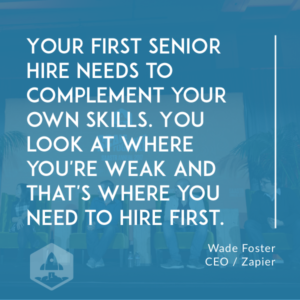
Wade: Yeah. I think you need to get what complements yourself too. For us, my founder is way more technical. It makes sense that that would be the role that comes in as the CTO. You look at where you’re weak and that’s where you need to hire first. I think it’s pretty simple.
Mallun: What was your first?
Nikos: CFO. Basically, it was the one thing I was totally clueless about.
Mallun: How early did you hire a CFO?
Nikos: Not early, at 50 people. I don’t know if that’s early or not.
Wade: It’s about the same with us.
Dan: What your CFO does? What’s his responsibility? It’s just finance or it’s more strategic, like how you price, how you…
Nikos: A good CFO quickly solves the finance problem, but then starts owning strategic thinking about the business model of the company, and what is efficient, and how we should grow, and how you should budget.
Dan: And how it works with the VP of sales, for example?
Nikos: Yes.
Dan: How it working together?
Nikos: They usually work together on comp plans and modifying whether it’s sufficient performance. They work with the CEO to figure out the financing strategy. When you grow, it becomes a point where your financing cannot be, “Oh, it’s a Series A. Now it’s a series B. Just raise some more equity.”
There’s more ways to think about the cash flow and financing of the company. Somebody who knows how to do this opens up your eyes, at least mine because I was clueless for this.
Wade: For me, it made it a lot easier to more confidently spend money. She can go to the various VPs we have and say, “Hey, this is a problem you’re having. Here’s how you can spend money to solve these problems.”
Whereas before, it was like, “Do we have the money for that? Am I spending too much money here?” There’s just some uncertainty there. A great CFO will come in and just…
Mallun: Dan, you said you have a VP of finance, you don’t have a CFO. Everyone else has a CFO. We’re a public company. We have a CFO. I’m curious what the difference is between a VP of finance in your mind. You didn’t have a CFO in your other companies, versus a CFO.
Craig: We had VP finance basically to make sure that books and the finance were rock solid, audit went well, money was well spent, the plan made sense. CFO, in our case, really was operational cadence. What are our enterprise deal reviews, what are the reports we’re generating, what is rep productivity?
Prior to having a CFO, we had a lot of just best efforts, tons of athletes, go out and kick ass as much as we can. Then to have a CFO really come in and drive metrics around that and say, “Here’s where we are. Here’s our effective ramp period for an effective sales rep. If we raise and hire this many more, what’s the amount of leads? Is it going to be enough to feed these guys? They’ll be productive at this stage. Then it’s going to be like this.”
Having, really, that discipline, to me, was really the difference. Just the credibility of having done it before and gone through and seeing this motion of how do you scale an organization from $20 to $200 million, that’s really nice experience that, frankly, a lot of people don’t have.
Nikos: For me, the VP finance makes sure you don’t go to jail. You don’t run out of money. The CFO makes sure you invest your money cleverly. It’s a slightly different level of financial management.
[off mic comment]
Nikos: They could as well.
Mallun: [laughs]
Nikos: Actually, yeah. The CFO’s role is also to make sure that they control the CEO. It’s a very important function, the check on the CEO as well.
Mallun: One of the things that everyone touched upon was the right timing for hiring a management team or a senior hire. One thing that I’ve had before is, like many of us, we meet with a lot of companies, we meet with a lot of founders.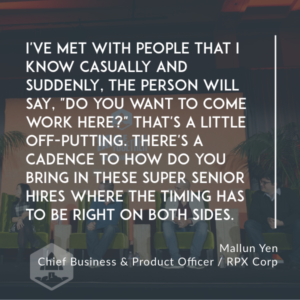
What’s interesting is, how do you hire that first senior hire? Because I’ve met with people, where I know them casually and suddenly, the person will say, “Do you want to come work here?”
I have to say, that is a little off putting. I actually think that there’s a cadence to how do you bring in these super senior hires where the timing has to be right on both sides. It’s not just about suddenly, you’re having coffee and says, “Do you want to work here?” It’s awkward, I have to say, and I don’t really see that person much anymore.
Good CFOs are hard to find, good VPs of sales are hard to find. I would actually love to hear your thoughts on that.
Dan: It’s kind of a dating period. It’s not immediately. Our EVP of sales, which is amazing, he actually started as a consultant. He come and helped us. “That, you can do better. That, you can do better.”
You build a relationship. Only a few months later, we’re like, “OK. Come work here.” All the reps already knew him and everybody already knew him. It was like, makes sense. That was our first hire. It was so makes sense, took us almost 7 months to complete that hire. We have the results. That’s how it’s…
[crosstalk]
Mallun: It seems like when you hire that way, it’s less jarring of an issue of topping because the teams worked with that person already. Because it’s a really serious issue, right? When you hire someone who’s coming in on top of the team who has been working really hard.
What I find is, a lot of those natural athletes are so good at so many things that they do think that they can do everything. Some of those natural athletes aren’t great at managing. It’s hard for them to hear that they aren’t great at managing. Doing it that way is always a little easier, I don’t know.
Wade: Yeah. That’s been our approach too when we brought in our CFO. I sent a ton of emails just to learn from different people. “Hey, I want to learn more about how you think about this role, how it works for your company,” so I could start to form my own opinions.
Some of those started to develop into deeper relationships. Then with Jenny, our CFO, we actually ended up starting to work on the little things here and there. Over some time, it’s like, “This is going pretty well. Would you consider doing this full time with us?” That’s how it worked out.
It wasn’t just like, “Oh, my god. You’re the first CFO I’ve met. Come work here.” [laughs] “I need you so much right now.”
Mallun: By the way, you won’t get an office. You have to work from home.
Craig: One of the things that I found that was really helpful because hiring an enterprise VP sales or an enterprise marketing person or even a CFO, if you haven’t done it before, I really had no idea what to look for, like what are the traits? That was one of the better things that our VCs helped us with.
They’re like, “Hey, don’t hire any of these guys because they’re in other portfolio companies but we’re getting to set you up for lunches or meetings with three great CFOs, guys that we think are fantastic, or three great marketing guys, or three great sales guys.”
After you spend time with them, at least you’d have a better understanding of what their commonalities are, what you’re looking for in your actual candidate, which was entirely different from how I always use to hire. It’s much more effective that way. Meeting or talking to as many people who are great at it before you go out and hiring I thought was really helpful.
Mallun: How did you end up finding yours?
Craig: A couple of headhunters.
Nikos: That has always been my biggest problem, that for the function you need the most, you don’t know what great looks like. Actually, that brings me to another point. I know one of the things I always have a bias for is I usually try to turn to my own network and a close network, the people I work with.
Very often, I’m tempted to hire someone who’s not done this function before but I have worked with before. I know they’re a star. How many of you have hired people like that?
Wade: Yeah, for sure.
Nikos: Is it a good thing or a bad thing? I just want to know for myself.
Dan: I can say that, there is probably some WalkMe folks in the audience. A lot of my friends working in the company, people that were with me, I’m from Israel, that were with me in the army. We hire from the same unit. We know exactly what we want, people that we know for years. It’s amazing even if we bring someone…
Nikos: Isn’t there a risk that you create a monoculture, to bring the people that were successful with you in your previous company and build your previous company essentially, or part of it? When I’ve hired people I’ve never knew before and came from a different culture, for me was great because they did some things I would never have imagined to ask for. I know you have something there.
Craig: Let me go the opposite on that. Being able to have a level of familiarity and comfort and knowing that you guys have shared values and shared missions and you don’t have to worry about someone doing the wrong thing, it really helps you just to execute more quickly.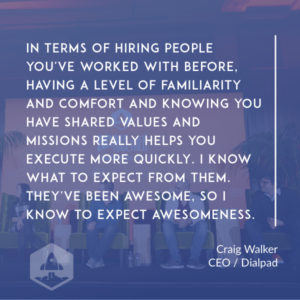
I know what to expect from them, but they’ve been awesome, so I know to expect awesomeness. It’s a real comfort to have your first 20 to 30 employees that have all spent at least three or four or five years together working at other jobs. Then, your next 20 hires are usually like one degree of separation from this core group that really gives you this unfair advantage of starting this startup.
That is a very tense, nervous, uncertain time with a group that feels very comfortable together, and I think that’s a secret to this success.
Nikos: You’re suggesting that familiarity is…I think it also has to do with trust, am I right? You’re going to cede control over big parts of your business. How about that? What advice do you have for this?
Wade: Trust is probably the most important piece. If you can’t trust your management team, then you’re always going to be second guessing them.
You’re always going to be double checking everything that they do, and it’s just going to drive you nuts. You have to able to build that trust with them and have that trust with them, and if you don’t, it’s not going to work out.
Nikos: How do you do that?
Wade: You get to know them, right? How do you build trust with anyone? You spend time with them, you get to see how they work. If they do things well, then you’re going to build trust with them. If you take care of them well, they’re going to trust you.
Mallun: For us, even today…again we’re at a different stage of a company than some of you. As I’m sitting here, and I hadn’t thought about it before, not a single one of our senior management came from a headhunter or someone we didn’t know.
I just brought in two SVPs in the company, and I’ve been recruiting them, talking to them for three years, but the timing had to be right on both sides. I agree that, especially in the early days, you have to be so lockstep in your mission and going forward.
You also want to make sure that you bring in people who have experienced things different than what was in your original company, or else you’re going to do things the same way over and over again.
That being said, we actually haven’t brought people in that we don’t know, but the folks on the management team have different enough networks that we’ve all brought in people. I come from a big company background, and others have never been in a big company. I think that that has actually been a key to why it’s successful.
Even though we haven’t gone the headhunter route, you’re not bringing in a bunch of homogenous individuals who are leading a company, because I think, especially as you get a little bit more mature, that can be dangerous.
Nikos: How do you onboard and integrate an executive that’s coming in?
Dan: I think, and I will continue your point, it’s all about KPIs. When someone new joins and it’s about trust as well, we need to know about the KPI, and I think this is why this conference is awesome.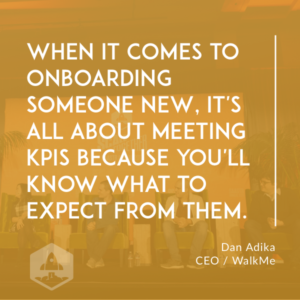
It wasn’t been there 10 years ago. What is SaaS metrics? What is good? CAC, KSP, how you do it? I think now it’s more clear in their benchmarks.
When someone new comes, you know what to expect from them, and then, it easier to integrate them, because, “OK. This is what I’m expecting in the first six month. That’s the KPI. That’s where we wanna be.”
When that is clear, I think it’s very easy to work with a new hire. Sometimes they have their own ideas or their own way, but as long as we’re agreeing on the same KPI, and that KPI needs to be achieved, they make at least my work with my management team super easy.
Nikos: I understand that in some cases it works. In some cases, it’s very simple, because you know really what you want to achieve, or you have an established structure inside the company. You know the goals, and basically you hand someone the keys and tell them, “Just bring me that goal.”
It’s not always like that. For example, in my experience, when I hired a CFO, I’m not sure I really knew what success looked like, or the things that I had in my mind, the things that I had in plan and I asked for were a fraction of what we ended up having to do over there.
Always, my personal struggle is how much do you ask them to make the plan and define success. In fact, I tend to think that the really successful executives are the ones who can actually do that part.
Dan: To exceed what you expect.
Nikos: Not just to exceed, to actually define what success in this function should be like for the particular company, and it’s really difficult for someone who doesn’t know the company even if you’ve been courting them for years.
Dan: For me, it will be extremely difficult to bring someone if I don’t know what their KPI is. I would just not make the hire. At least for me.
Nikos: Any thoughts on that?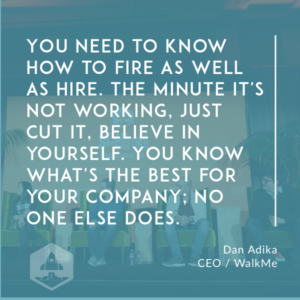
Craig: Yeah. A lot of these senior execs that you bring in later on, obviously they’re coming in because they’re filling the gap that you don’t have. Had I not gone through the experience of getting to know what I was looking for beforehand, or getting to know what a good set of outputs from any of these hires would be, you’d be little bit lost.
You’d be a little bit dependent on hoping you got a lucky hire, a good hire, but you wouldn’t know until later, so really kind of understanding what success looks like, what those KPIs would be, and then checking references like crazy, and then dropping the guy in and giving them a freedom to do it. I think that’s a way to run.
Nikos: It’s good. I think that we’re nearly done. Anyone want to have any final comments before the time runs out?
Dan: I do want to say, at least for the people here, that building their companies as someone that got burned…the title here is how to build or how to hire your management team.
You need to know how to fire as well. The minute it’s not working, just cut it, believe in yourself. You know what’s the best for your company, no one else does.
Nikos: And on that cheerful note, thank you very much, thank you for attending.
[applause]
Nikos: Thank you all.


